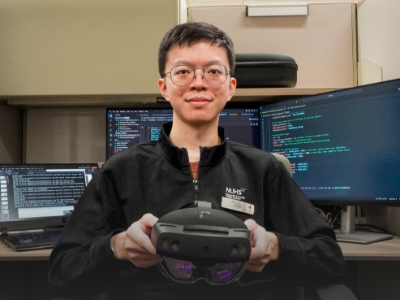Published on 9 December 2025
MediVoice, a voice-to-documentation AI tool that captures clinical notes and conversations with patients, is easing the burden of paperwork and giving healthcare staff more time to focus on care.
At a glance
- NUHS’ MediVoice transcribes consults, cutting paperwork so staff can focus on patients.
- Early findings show nearly 27 per cent time saved per consultation, especially in long, complex specialties.
- Built with privacy safeguards and ground support, it is set to evolve into a voice-driven AI agent.
Clinical paperwork has long eaten into time meant for patients. At the National University Health System (NUHS), an in-house ambient AI tool called MediVoice is starting to change that, saving about 13 minutes per consultation — nearly 27 per cent of time freed up for care.
“The burden of clinical documentation affects all healthcare professionals,” said Dr Clara Ngoh, Assistant Group Chief Technology Officer, NUHS. “Ambient AI like MediVoice holds the promise of easing that burden, saving time, and allowing for more meaningful conversations with patients.”
In-house AI easing documentation

NUHS’ MediVoice transcribes consultations in real time, easing documentatio
Developed in-house, MediVoice is a home-grown artificial intelligence (AI) transcription software that listens, transcribes and lightens the load of clinical documentation for healthcare professionals at NUHS. Built within NUHS’ secure environment, it is designed to protect patient confidentiality while supporting clinical work. It works in the background during consultations, capturing conversations and converting them into structured clinical notes.
Just a year ago, many nurses and doctors would finish a consult and turn immediately to the computer to type, summarise and file notes. Today, MediVoice does much of that in real time, freeing staff to stay focused on the person in front of them.
Early gains in time saved
The time saved has been most striking for nurses, particularly advanced practice nurses. Doctors in specialties such as psychiatry, psychological medicine and oncology, where consultations are often long, sensitive and complex, have also found MediVoice particularly useful.
“We’ve seen nursing transformed in some ways, especially in longer consults, where the time savings become even more evident. The value is also really clear in specialties that require deep, extended consults,” Dr Ngoh shared.
“In faster-paced settings where lab tests and results are heavily integrated, the impact may be smaller, but that’s the natural curve of adoption for any technology.”
Change management and trust
Rolling out MediVoice required more than technological readiness.
“There were many implementation challenges with MediVoice, including privacy and consent,” said Dr Ngoh. NUHS also had to win staff buy-in and reassure patients that sensitive clinical conversations would remain protected.
“Our team believes the biggest success from this product implementation exercise has been developing and sustaining a human infrastructure which includes senior management support, middle management layers such as the Digital Think Tank at Ng Teng Fong General Hospital (NTFGH) and the Kent Ridge Office of Innovation at the National University Hospital (NUH), and AI user champions to drive last-mile adoption.”
“This infrastructure scaffold will be key for scale and sustainability of future innovation projects,” she said.
“We’re in an age of digitalisation where the workforce is ready for change,” Dr Ngoh added. “With strong support from senior management and active ground-up involvement, the implementation of MediVoice was smooth.”
“In the past, a doctor might jot notes on paper or type them into the electronic record. MediVoice does the same thing, only in a more modern way,” she said.
Beyond clinical notes
This aligns with NUHS’ Healthcare Workforce of the Future (HWF), a ground-up roadmap to future-proof the organisation by lightening workloads and strengthening care delivery. MediVoice is one example of how NUHS is doing this through in-house innovation to redesign jobs and revitalise technology.
What comes next
MediVoice has been benchmarked against other similar local ambient AI tools such as Synapxe’s Tandem and OGP’s Scribe, and has demonstrated strong contextual accuracy in medical settings.
While there are still some limitations — including transcript latency and the lack of integration with electronic medical records — Dr Ngoh remains optimistic about how the tool will evolve. With healthcare professionals overseas already using ambient AI to order lab tests and medications directly into the system, she believes it is only a matter of time before Singapore sees the same.
Looking ahead, she envisions MediVoice moving beyond transcription to become a voice-driven AI agent — one that not only captures information, but also executes tasks and orchestrates workflows across both clinical and administrative domains.
“It’s not so much a dream anymore. It’s just a matter of when. We’re hopeful, because every step we take with MediVoice is a step towards a more human, more connected healthcare experience.”
|
In consultation with Dr Clara Ngoh, Assistant Group Chief Technology Officer, NUHS.




